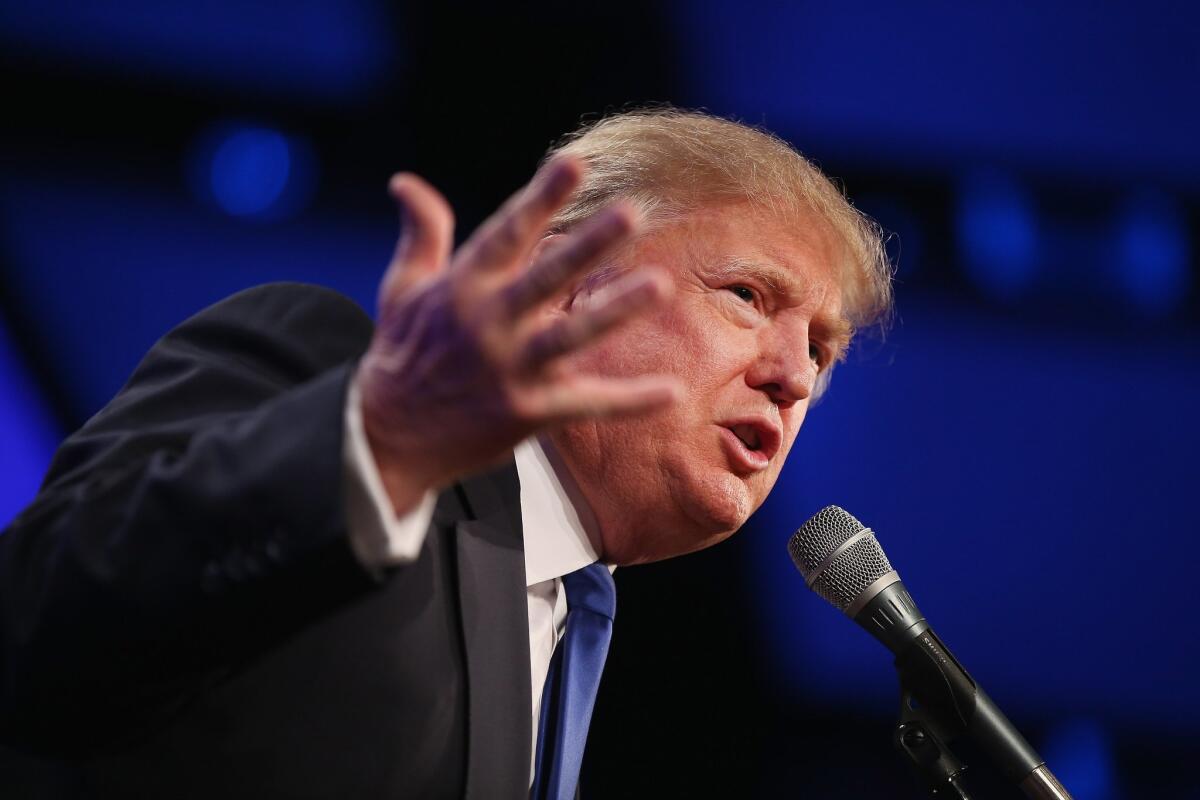Polls may actually underestimate Trump’s support, study finds

Donald Trump speaks at the Republican Party of Iowa’s Lincoln Dinner in Des Moines on May 16.
- Share via
Reporting from Washington — Donald Trump leads the GOP presidential field in polls of Republican voters nationally and in most early-voting states, but some surveys may actually be understating his support, a new study suggests.
The analysis, by Morning Consult, a polling and media company, looked at an odd occurrence that has cropped up repeatedly this year: Trump generally has done better in online polls than in surveys done by phone.
The firm conducted an experiment aimed at understanding why that happens and which polls are more accurate -- online surveys that have tended to show Trump with support of nearly four-in-10 GOP voters or the telephone surveys that have typically shown him with the backing of one-third or fewer.
Their results suggest that the higher figure probably provides the more accurate measure. Some significant number of Trump supporters, especially those with college educations, are “less likely to say that they support him when they’re talking to a live human” than when they are in the “anonymous environment” of an online survey, said the firm’s polling director, Kyle Dropp.
With Trump dominating political debates in both parties, gauging his level of support has become a crucial puzzle. The Morning Consult study provides one piece of the solution, although many other uncertainties remain.
Among the complicating factors is this: The gap between online and telephone surveys has narrowed significantly in surveys taken in the last few weeks. That could suggest that Republicans who were reluctant to admit to backing Trump in the past have become more willing to do so recently.
Another issue is that not only can polls change over time, but Trump’s support in pre-election surveys might not fully translate into actual votes. He has not invested as heavily as some of his GOP rivals in building the kind of get-out-the-vote operation that candidates typically rely on, particularly in early voting states.
Some of the polls that show heavy support for Trump have also shown him doing better among self-identified independents who lean Republican than among regular GOP voters. At least some of those independents may not be in the habit of voting in primaries and caucuses, which could make a robust turnout operation even more necessary.
On the other hand, a candidate of Trump’s level of celebrity may simply not need much of a get-out-the-vote operation. No one really knows.
Another complication is that most polls made public this year have been of people nationwide, not of voters in the states that actually hold the first primaries. In Iowa, which will kick off the election season with party caucuses on Feb. 1, Trump has slipped into second place, trailing Sen. Ted Cruz of Texas in the majority of recent polls.
In New Hampshire, which holds the first primary, on Feb. 9, Trump leads, but less dramatically than in national polls. In recent weeks, he has averaged a bit more than one-quarter of the vote there.
Still, the Morning Consult experiment sheds considerable light on an issue that has puzzled pollsters for months.
The firm polled 2,397 potential Republican voters earlier this month, randomly assigning them to one of three different methods -- a traditional telephone survey with live interviewers calling landlines and cellphones, an online survey and an interactive dialing technique that calls people by telephone and asks them to respond to recorded questions by hitting buttons on their phone.
By randomly assigning people to the three different approaches and running all at the same time, the researchers hoped to eliminate factors that might cause results to vary from one poll to another.
The experiment confirmed that “voters are about six points more likely to support Trump when they’re taking the poll online then when they’re talking to a live interviewer,” said Dropp.
The most telling part of the experiment, however, was that not all types of people responded the same way. Among blue-collar Republicans, who have formed the core of Trump’s support, the polls were about the same regardless of method. But among college-educated Republicans, a significant difference appeared, with Trump scoring 9 points better in the online poll.
The most likely explanation for that education gap, Dropp and his colleagues believe, is a well-known problem known as social-desirability bias -- the tendency of people to not want to confess unpopular views to a pollster.
Blue-collar voters don’t feel embarrassed about supporting Trump, who is very popular in their communities, the pollsters suggested. But many college-educated Republicans may hesitate to admit their attraction to Trump, the experiment indicates.
In a public setting such as the Iowa caucuses, where people identify their candidate preference in front of friends and neighbors, that same social-desirability bias may hold sway.
But in most primaries, where voters cast a secret ballot, the study’s finding suggests that anonymous online surveys -- the ones that typically show Trump with a larger lead -- provide the more accurate measure of his backing.
“It’s our sense that a lot of polls are under-reporting Trump’s overall support,” Dropp said.
For more on politics and policy, follow @DavidLauter
More to Read
Get the L.A. Times Politics newsletter
Deeply reported insights into legislation, politics and policy from Sacramento, Washington and beyond. In your inbox twice per week.
You may occasionally receive promotional content from the Los Angeles Times.











